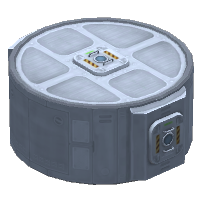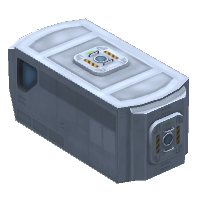Difference between revisions of "Mk2 Lander Can"
(→Usage) |
AlpacaMall (talk | contribs) m (→Trivia: noted Mk2 in name is not Mk2 size) |
||
| (5 intermediate revisions by 4 users not shown) | |||
| Line 1: | Line 1: | ||
{{:Mk2 Lander Can/Box}} | {{:Mk2 Lander Can/Box}} | ||
| − | The '''Mk2 Lander Can''' is a [[ | + | The '''Mk2 Lander Can''' is a [[command module]] housing two [[Kerbal]] crew members during their mission. It has two variants: a cylindrical lander and a rectangular manned rover body. |
== Usage == | == Usage == | ||
[[File:Mk2canCockpit.JPG|thumb|left|View of the cockpit from inside]] | [[File:Mk2canCockpit.JPG|thumb|left|View of the cockpit from inside]] | ||
| − | Generally placed at the top of the rocket as part of a lander or rover, the Mk2 Lander Can provides full command module functionality. | + | Generally placed at the top of the rocket as part of a lander or rover, the Mk2 Lander Can provides full command module functionality. While it features two "Rockomax" [[Radial size|size 2]] nodes on the top and bottom, it also features two size 1 nodes on the front and back. |
| − | Like its smaller counterpart the [[Mk1 Lander Can]], the Mk2 Lander Can is well-suited to perform [[IVA]] landings given its superior downward visibility versus other pods. | + | Like its smaller counterpart the [[Mk1 Lander Can]], the Mk2 Lander Can is well-suited to perform [[IVA]] landings given its superior downward visibility versus other pods. The service bays on the side are also very useful in storing and concealing science experiments, batteries, power sources and other small parts, which can save on both the mass and part count of a dedicated Service Bay, although it cannot hold as much. |
| − | The | + | The Rover variant removes the sides of the Mk2 Lander Can containing the service bays, in exchange for a flat surface for mounting wheels. With the control point toggle, once can switch between the default, upward facing control point to the forward facing control point in-flight, for better control while driving. |
| − | Despite the manufacturer's description, the Mk2 Lander Can has the same thermal tolerance as other | + | Despite the manufacturer's description, the Mk2 Lander Can has the same thermal tolerance as many other parts, although it is still lower than most command modules. It is able to survive low-speed atmospheric re-entry. However, the front window protrudes out from the 2.5m structure, which means that the Mk2 Lander Can cannot be protected by a [[Heat Shield (2.5m)]]. |
| + | |||
| + | If 2 pilots are aboard, the ship containing this lander can will be able to [[Probe Control Point|control probes]] or rovers without a connection to the KSC. | ||
== Product description == | == Product description == | ||
| Line 38: | Line 40: | ||
Mk2can.png|The lander can prior to [[1.6]] | Mk2can.png|The lander can prior to [[1.6]] | ||
</gallery> | </gallery> | ||
| + | |||
| + | == Trivia == | ||
| + | * The Mk2 Lander Can is one of two parts produced by its manufacturer, [[Category:Sean's Cannery|Sean's Cannery]] (with the other being the [[Making History]]-exclusive [[Munar Excursion Module (M.E.M.)]]. However, the description for Sean's Cannery calls their flagship product the "Lander Can Mk1 Cockpit". One interpretation of this is that the Mk2 Lander Can was originally called this. | ||
| + | * Despite its name, the Mk2 Lander Can does not have a Mk2 [[radial size]]. | ||
== Changes == | == Changes == | ||
| + | ;[[1.8]] | ||
| + | * Increased crashTolerance from 8 to 20 | ||
;[[1.6]] | ;[[1.6]] | ||
* New model and texture | * New model and texture | ||
Latest revision as of 05:35, 28 July 2021
| Mk2 Lander Can | |||||
| Command pod by Sean's Cannery | |||||
| Radial size | Large | ||||
| Cost | (total) | 3 320.00 | |||
| (dry) | 3 202.00 | ||||
| Mass | (total) | 1.515 t | |||
| (dry) | 1.167 t | ||||
| Drag | 0.15-0.2 | ||||
| Max. Temp. | 2000 K | ||||
| Impact Tolerance | 20 m/s | ||||
| Research | | ||||
| Unlock cost | 8 200 | ||||
| Since version | 0.18 | ||||
| Part configuration | mk2LanderCan_v2.cfg | ||||
| Crew capacity | (maximum) | 2 | |||
| (required) | 1 | ||||
| SAS level | × None | ||||
| Torque | 15 kN·m | ||||
| Electricity required |
| ||||
| Experiment | Crew Report | ||||
| Collectable | No | ||||
| Rerunnable | Yes | ||||
| Resettable | Yes | ||||
| Electricity required | None | ||||
| Antenna type | Internal | ||||
| Antenna rating | 5 km | ||||
| Required crew | 2 | ||||
| Multihop | No | ||||
| Packed volume | None | ||||
| Inventory Slots | 2 slots | ||||
| Volume limit | 100 l | ||||
| Monopropellant | 40 | ||||
| Electric capacity | 100 ⚡ | ||||
The Mk2 Lander Can is a command module housing two Kerbal crew members during their mission. It has two variants: a cylindrical lander and a rectangular manned rover body.
Usage
Generally placed at the top of the rocket as part of a lander or rover, the Mk2 Lander Can provides full command module functionality. While it features two "Rockomax" size 2 nodes on the top and bottom, it also features two size 1 nodes on the front and back.
Like its smaller counterpart the Mk1 Lander Can, the Mk2 Lander Can is well-suited to perform IVA landings given its superior downward visibility versus other pods. The service bays on the side are also very useful in storing and concealing science experiments, batteries, power sources and other small parts, which can save on both the mass and part count of a dedicated Service Bay, although it cannot hold as much.
The Rover variant removes the sides of the Mk2 Lander Can containing the service bays, in exchange for a flat surface for mounting wheels. With the control point toggle, once can switch between the default, upward facing control point to the forward facing control point in-flight, for better control while driving.
Despite the manufacturer's description, the Mk2 Lander Can has the same thermal tolerance as many other parts, although it is still lower than most command modules. It is able to survive low-speed atmospheric re-entry. However, the front window protrudes out from the 2.5m structure, which means that the Mk2 Lander Can cannot be protected by a Heat Shield (2.5m).
If 2 pilots are aboard, the ship containing this lander can will be able to control probes or rovers without a connection to the KSC.
Product description
| “ | This cozy capsule seats two, and is very lightweight. However, don't expect it to survive atmospheric entry or even a sneeze. — Sean's Cannery |
” |
Variants
As of version 1.6 this command pod has two models that can be switched in the editor.
Gallery
Trivia
- The Mk2 Lander Can is one of two parts produced by its manufacturer, (with the other being the Making History-exclusive Munar Excursion Module (M.E.M.). However, the description for Sean's Cannery calls their flagship product the "Lander Can Mk1 Cockpit". One interpretation of this is that the Mk2 Lander Can was originally called this.
- Despite its name, the Mk2 Lander Can does not have a Mk2 radial size.
Changes
- Increased crashTolerance from 8 to 20
- New model and texture
- Added 2 variants
- New IVA
- Decreased mass from 2.5 to 1.355
- Cost increased from 950 to 3250 (48 of which is monoprop cost)
- Added 40 units of monopropellant storage
- Initial Release







